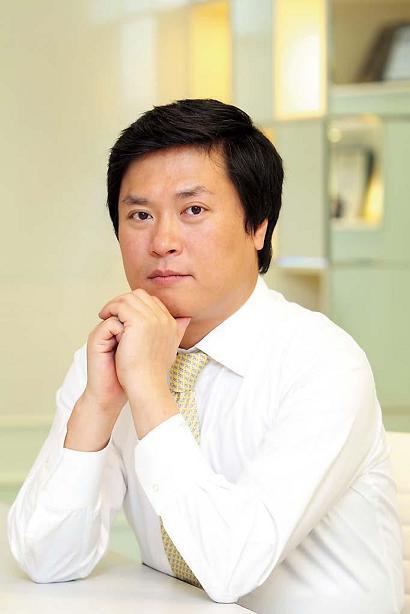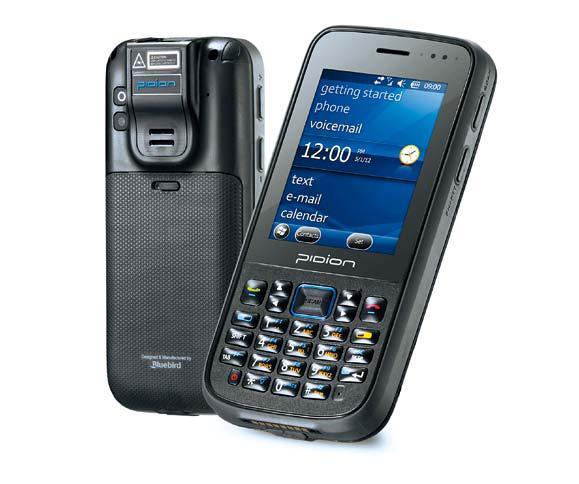 |
Lee Jang-won, CEO of Bluebird Soft |
Korea’s No. 1 industrial smartphone maker eyes IPO to boost global recognition
When Lee Jang-won set out to establish his first venture tech firm in 1995, he built a company named Bluebird Soft that developed messenger software for enterprises.
But its early tech products were “far ahead of its time,” said Lee, the founder and CEO of Bluebird Soft.
“We were, then, making communication software for VoIP, and mobile and PC messengers that can be seen as today’s Kakao Talk,” Lee said.
“Soft” is part of the company’s name as it started out as a software developer, he noted. But three years after its establishment, Lee said, he had to find a new tech business model that can make the company sustainable as its initial software business did not post solid growth.
Bluebird Soft made a “180-degree” transformation by becoming a hardware company in 1998 when it started manufacturing mobile computers, known as enterprise digital assistants, or simply, “industrial smartphones.”
 |
Bluebird’s Pidion industrial smartphones |
“We jumped into this hardware business as it showed potential especially overseas, and it was a business which local conglomerates could not do and (where they) had no presence,” Lee explained.
After venturing into this sector for 13 years, Bluebird is now the top industrial smartphone maker in Korea with over an 80 percent market share. It is also among the well-known global players alongside Ingenico, Intermec, Honeywell and Motorola Solutions.
Whenever consumers see a postman holding a mobile device on which people are asked to sign their names after receiving their parcels in Korea, such EDA is Bluebird’s “Pidion” brand product. Consumers can also see those industrial smartphones at major Korean shopping malls where employees swipe credit cards on them.
Its presence extends overseas such as in Shanghai, China, where policemen carry Bluebird’s industrial smartphones to do background checks and give tickets. In Europe, bullet train staff check passenger tickets with their industrial smartphones. European flight attendants use them to charge passengers who purchase duty-free goods on board the plane, Lee noted.
Industrial smartphones are very similar to smartphones consumers use nowadays such as Apple iPhones and Samsung Galaxy S.
They both have applications running on operating platforms. But EDAs need to operate on highly advanced platforms provided by Microsoft’s Windows Mobile and Google’s Android.
Also, industrial smartphones carry simplified, yet sophisticated apps that can do business processes such as inventory management, logistics and delivery services.
“They are one part of a management system with an average product life cycle of four to five years used in a wide variety of industrial sectors,” Lee explained.
Industrial smartphones are embedded with barcode recognition software, radio-frequency identification chips, processing cards for security and financial settlement.
They especially need to be unbreakable as they are used in the field, and are produced in small amounts for niche markets.
Consumer smartphones, in contrast, are massively produced for the general public and can be launched in a series as they have shorter life cycles.
Lee said Bluebird seeks to expand its Pidion product lineup by developing, for instance, mobile computers that can endure harsh weather.
“We want to make something that has never been done before such as industrial smartphones that can be used in cold weather with 40 degrees below zero or in the desert,” he said.
Lee also said that he is considering an initial public offering of Bluebird after further strengthening its “business fundamentals.”
It could launch an IPO in a couple of years, but this really depends on the conditions of the global financial markets.
The company, which posted sales of some 100 billion won in 2011, could seek to list on either KOSPI or KOSDAQ as it would boost its corporate recognition in the global markets. This year, it aims to achieve 130 billion won in sales.
It had initially considered going public on the U.S. NASDAQ or on the Hong Kong stock market as Bluebird posts bigger sales overseas than in Korea. Overseas sales account for 80 percent of the total, Lee said, noting that it will reach 90 percent in the near future.
Lee, who graduated from Seoul National University with a master’s in industrial engineering, hopes to build another venture tech start-up after making Bluebird a stronger entity.
“I want to discover the ‘New World’ (in the tech market) after further building Bluebird and handing the company over to a management specialist,” he said.
By Park Hyong-ki (
hkp@heraldcorp.com)






![[Exclusive] Hyundai Mobis eyes closer ties with BYD](http://res.heraldm.com/phpwas/restmb_idxmake.php?idx=644&simg=/content/image/2024/11/25/20241125050044_0.jpg)

![[Herald Review] 'Gangnam B-Side' combines social realism with masterful suspense, performance](http://res.heraldm.com/phpwas/restmb_idxmake.php?idx=644&simg=/content/image/2024/11/25/20241125050072_0.jpg)
